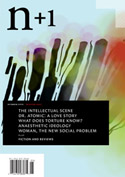A few months ago, I wrote a magazine article about the experience of spending a day without any digital devices—no cell phone, no Internet, no computer. Unfortunately, the piece was edited to express almost none of my ambivalence about the state we technology users currently find ourselves in—assaulted all day long by emails, unable to resist using our cell phones, content to set our iPods to shuffle. The article I wish I had written appears in the current issue of n+1’s opening department, “The Intellectual Situation.”
In it, the editors address cell phones, email, and the blogosphere. On email: “. . . it has lately become clear that nothing burdens a life like an email account. It’s the old story: the new efficient technology ends up costing far more time than it ever saves, because it breeds new expectations of what a person can possibly do. . . . The true mood of the form is spontaneity, alacrity—the right time to reply to a message is right away. But do that and your life is gone.”
On the cell phone: “The two effects, for the individual, of the cell phone’s contribution to the decivilizing process are ceasing to be able to be alone, and yet refusing solitude without entering into company. This leads to the loss of one of the great comforts of modern urban life…the fraternity of solitude. Sometimes you eat dinner alone; sometimes you do your grocery shopping alone; often you’ll ride the bus alone. At such times, in a city, there are always other people who are dining alone, shopping alone, sitting in their bus seats alone, in exactly the same situation. The fraternity of solitaries is always there for you to join. . . . Go into a restaurant now, sit near a fellow single diner, and you will see him dial his cell phone during the appetizer and talk through to dessert. The only choices you have are to pull out your own phone or listen in.”
Their point about how cell phones prevent you from being able to be alone, to seek real solitude, combined with the barrier they provide to real connection is dead on. How many times have you been hanging out with someone when their cell phone rings or they decide they have to call someone? It doesn’t even have to happen, but the idea that it can, that it could, prevents us from ever fully being able to focus on individuals for any length of time in our daily lives.
For some reason, I feel like Jonathan Franzen once used the phrase “fraternity of solitude,” but no matter. I’ve been reading n+1 ever since it debuted, and it may now, after its previous issue’s survey of American writing and the 10 pages I’ve read of the new issue, be my favorite magazine. Period.

I hope this doesn’t mean that you’re not going to write it yourself!
You know I’m always on the phone or email because of my job. But as far as being alone: thus far in my short career of trying to be a writer, I have never felt more alone at work, at home, or just, anywhere.
I’m constantly in this sudden, unexpected position of being incredibly intimate with people whom I interview — they tell me things that are most important to them; they describe experiences that are personal, painful, joyful…and I have to ask them for every detail. And then within a day, they are gone from my life, so to speak. I end the interview and then have to write about it before I move on to the next person. In many ways, I have no real connections to the people I interview. And no matter how I write about them, the lives of these people are still more real to me than to my readers, no matter how I write about them.
Yes, cell phones, emails, and the internet all facilitate my job. But I fail to see how they can make me feel more or less alone. I think if you crave the ability to be alone (and if you crave that “fraternity of solitude”) there is no better solution than to be a writer.
Comment by evicious — 2/27/2007 @ 10:34 pm